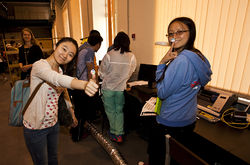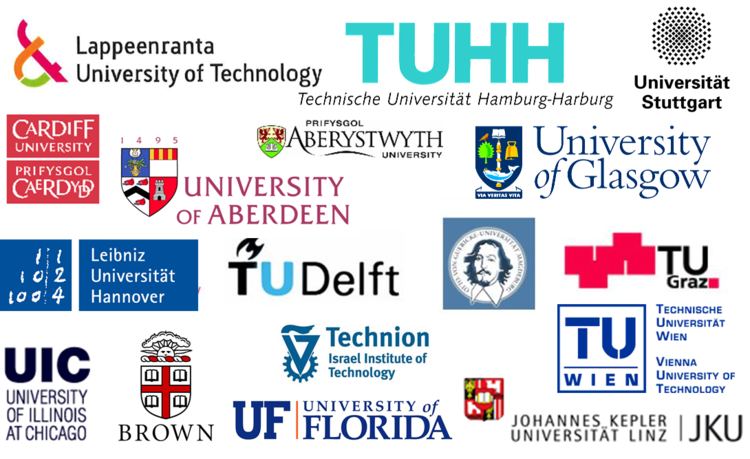Difference between revisions of "International collaboration"
m |
m |
||
| Line 2: | Line 2: | ||
[[File: IR.jpg|250px|right|]] | [[File: IR.jpg|250px|right|]] | ||
| − | ==Foreign policy of Department | + | ==Foreign policy of Department of Theoretical and Applied Mechanics== |
International cooperation is one of the most important branches of "Theoretical and Applied Mechanics" department’s activities that contribute to training of highly qualified specialists, development of priority areas in mechanical science and high quality education. | International cooperation is one of the most important branches of "Theoretical and Applied Mechanics" department’s activities that contribute to training of highly qualified specialists, development of priority areas in mechanical science and high quality education. | ||
Revision as of 14:00, 4 February 2016
Contents
Foreign policy of Department of Theoretical and Applied Mechanics
International cooperation is one of the most important branches of "Theoretical and Applied Mechanics" department’s activities that contribute to training of highly qualified specialists, development of priority areas in mechanical science and high quality education.
The Department maintains close relations with many foreign educational establishments, public, state, and international organizations, including Universities of Austria, France, Germany, Finland, USA, Great Britain, CIS countries, etc. (please scroll down to see the complete list)
Over fifty of the teaching staff members constantly participate in many different foreign and international scientific and professional societies, organizations, and associations.
Annually the Department of Theoretical and Applied Mechanics hosts over a dozen international scientific and educational events: conferences, symposia, seminars, trainings and schools.
Main goals and directions of the international activities
- Students and teaching staff academic mobility promotion.
- Development of innovative forms of mechanical education based on the international experience.
- Intensification of modern knowledge and technologies exchange.
Directions:
- Cooperation with foreign higher educational institutions in the fields of mechanical education, science and mathematical modeling, promotion of students and academic staff mobility.
- Scientific cooperation within international projects and agreements.
- Cooperation with various international organizations, engineering and scientific societies and professional associations.
- Optimal international activities formulation and implementation.
Academic mobility
A lot of international students and post-graduates have completed different internships at the Department. Also, many students have participated in various international internships and trainings.
There are several opportunities for the international education:
The program for international students: International Master Degree Program
The program for Russian students: Double Degree Program
International partners and projects
Australia
Austria
- Johannes Kepler University, Christian-Doppler Laboratory on Particulate Flow Modelling (Prof. Stefan Pirker)
- Johannes Kepler University, Institute of Polymer Product Engineering (Prof. Zoltan Major)
- University of Vienna (см. Fodor Patrick)
Estonia
Finland
- Lappeenranta University of Technology (see Double Degree Program)
- University of Oulu (Prof. Matti Alatalo)
France
- Arts et Métiers ParisTech CER Bordeaux (Dr. Damien Andre)
Germany:
- Technical University Kaiserslautern (Prof. S. Antonyuk)
- Hamburg University of Technology
- Halle Wittenberg, Martin-Luter University
- Magdeburg, Otto von Guericke University (see Double Degree Program)
- Leibniz Universität Hannover (Prof. Dr.-Ing. U. Nackenhorst, Олег Хромов, ru:Mona Dannert)
- Technische Universität Berlin (Prof. W.H. Muller)
- Universität Stuttgart (Prof. S. Schmauder, M. Korobeynikova)
Israel
- Tel Aviv University (Dr. Igor Berinskii)
- Technion, Mechanics of Soft Materials (Dr. Stephan Rudykh)
The Netherlands
Norway
- SINTEF (Dr. Alexandre Lavrov)
- FMC-Technologies (E. Melikhov, S. Shubin)
Poland
- Rzeszow University of Technology (Prof. A.M. Linkov, Prof. V.A. Eremeyev)
- EuroTech
- Institute of Molecular Physics, Polish Academy of Sciences (Prof. K.Wojciechowski)
Spain
Switzerland
UK
- Aberdeen University(Prof. M. Wiercigroch, Dr. E. Pavlovskaia)
- Aberystwyth University
- Cardiff University
- DEM Solutions Limited (Alliances Director, at DEM Solutions, Dr. S. Arumugam)
- Loughborough University (Prof. Vadim Silberschmidt)
USA
- AlpineReplay, Inc. (см. Проект "AlpineReplay")
- Sandia National Laboratory (Dr. J. Zimmerman, Dr. R. Jones)
- Brown University, (Prof. H. Gao)
- Brigham Young University, Department of Chemical Engineering (Prof. Dean R. Wheeler)
- Shell (Dr. Alexei Savitski)
- University of California at San Diego, (Tan D. Trinh)
- University of Florida (Prof. Y.Chen)
- Ruby-Valley Research Institute (Prof. W.G. Hoover, Prof. C. G. Hoover)
- Weatherford (Prof. Lev Ring)
- Tufts University (Prof. Mark Kachanov)
- Harvard Medical Shool Teaching Hospital (Prof. N. Vasiliev)
Contacts
If you have any questions feel free to contact Dr. Ekaterina Podolskaya.


